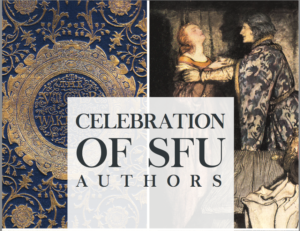The Information Cornucopia we call the web is a source of knowledge that can make us more effective. It is also a potential drain on the brain’s most precious resource, short-term awareness (which some people call “attention”).
Continue reading Distraction-Free Information Processing: The “Surf Strategically” Principle of Cognitive Productivity with macOS
2018 “Celebration of SFU Authors”
I know I am not the only SFU author who, while writing his or her book, looks forward to the annual “Celebration of SFU Authors” event.
The event is always held on the 7th floor of the SFU library, which is of course atop one of the world’s most beautiful cities.
The event is an opportunity to encourage academic dialogue and ensure that works by SFU Authors are available to the University community through the Library’s collection.
I appreciate the university’s encouragement, and the opportunity to mingle with other authors.
We(e) Sense-makers
We, humans, are designed to try to make sense of our experience. Coherence is deemed to be necessary for rationality. Rationality is a fundamental principle of humanism. However, it is impossible to ensure that the various models of the world, which we construct and carry with us, are coherent with each other and the world.
More Literature on Virtual Machines and Causation, and Some Notes on Research Paths
Following my previous blog post on Understanding Ourselves with Virtual Machine Concepts, I exchanged e-mails with Aaron Sloman on virtual machines (VM’s) and mathematics. Google Books had served me part of a chapter he wrote on the Poplog VM, published in Artificial Intelligence & Software Engineering (a book edited by Derek Partridge.) I asked for a PDF, which Aaron couldn’t find. But he kindly shared some more other papers on VM’s.
I thought I would share the information for anyone who was interested in my previous post. Below, you’ll also find references to two papers on five senses of mechanism, and some thoughts about choosing knowledge-building projects. Continue reading More Literature on Virtual Machines and Causation, and Some Notes on Research Paths
Understanding Ourselves and Each Other with Virtual Machine Concepts
There is a nexus of ideas that is relevant to the so-called “mind-body problem” and “consciousness”: that we can understand ourselves as a collection of interacting virtual machines. In this post, I’d like to convey some of the major features of virtual machines that make them interesting for understanding minds. Continue reading Understanding Ourselves and Each Other with Virtual Machine Concepts
Dear Twitter: Please Learn about CUP’A and Check Out My Publications
Dear Twitter,
As you may have noticed, I don’t visit you very often. If you want to attract me, try serving me content that is not only superficially Appealing to me (by this, I am referring to the “A” in “CUP’A“), but that is actually of high Caliber, Usefulness and Potency (yes, that is the part you are meant to drink from, the “CUP”). In other words, please become a content discovery tool towards which I would turn with cognitive enthusiasm. Continue reading Dear Twitter: Please Learn about CUP’A and Check Out My Publications
What Inspired Mrs. Robinson and Other Songs in The Graduate?
There must be a thesis on this somewhere: How did Simon & Garfunkle’s soundtrack to The Graduate come to be what it became? I don’t mean the administrative part. I mean: what was the specific assignment S&G received? What were the constraints? And more interestingly, how did S&G translate this assignment into the masterpiece they created? Continue reading What Inspired Mrs. Robinson and Other Songs in The Graduate?
Productive Practice Screencasts—Published on YouTube and in Cognitive Productivity with macOS
You’ve heard me sing the praises of productive practice — a form of deliberate practice and test-enhanced learning that involves “retrieval practice”. I’ve released the latest installment of Cognitive Productivity with macOS®: 7 Principles for Getting Smarter with Knowledge, which includes Principle 6 “Practice Productively”.
Presenting on Wearable Health Technologies at Engage Heart + Lung Health FEST 2018
I will present on “wearables and their health value” at the 2018 “Engage Heart + Lung Health FEST”. I will focus on psychological contributors to health. This University of British Columbia-affiliated event will be held Feb 6-7, at Sheraton Vancouver (registration here). Continue reading Presenting on Wearable Health Technologies at Engage Heart + Lung Health FEST 2018
Reading with Software is Better than Paper: Principle 5, “Delve Deeply”, of Cognitive Productivity with macOS
Many people are still not convinced that software is better than paper for reading in depth. I believe this is largely because current software is, in fact, not designed for this purpose. It’s also that the majority of people haven’t figured out how to select and utilize e-reading software. One can shoehorn learning strategies on top of the best reading software.
I’ve dedicated much of my professional life since 2001 to understanding what it would take for people to be able to learn deeply by reading and practicing with software. I’ve been designing new software and strategies for learning with current software. Cognitive Productivity and Cognitive Productivity with macOS® demonstrate that learning with (the right) software is far better than with paper and pen —for that small minority of people who really wish to improve themselves with knowledge.
Last month, I published Assess Analytically, which is Principle 3 of Cognitive Productivity with macOS®®. That principle helps you identify knowledge resources that are worth processing in depth. Yesterday, I published Principle 5, “Delve Deeply”. That chapter contains tips for identifying, understanding and utilizing knowledge gems within helpful documents (and other types of resources). Continue reading Reading with Software is Better than Paper: Principle 5, “Delve Deeply”, of Cognitive Productivity with macOS

